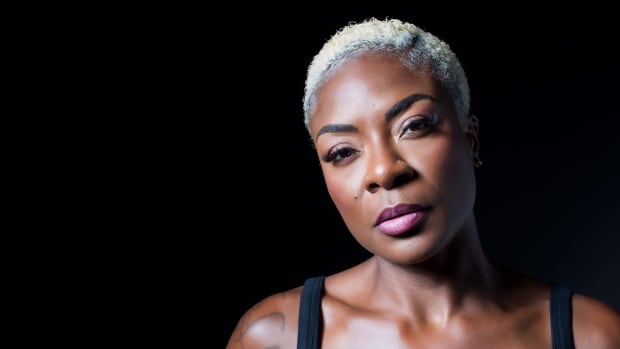Jully Black is one of Canada’s most accomplished and recognizable R&B voices.
She’s a Juno-winning singer, songwriter and stage performer whose nearly 30-year career includes hits such as Seven Day Fool and Sweat of Your Brow, and she’s known for doing things her own way.
Faced with the prospect of a “360 deal” that could sap her touring and merchandise revenue as well as her music sales, Black severed ties with her major label in 2010 and has been independent ever since. Black owns the masters of her recordings and is in creative control of her career.
In February 2023, Black performed the Canadian national anthem at the NBA All-Star game. She changed the opening lyrics to “O Canada, our home on native land,” sparking a national dialogue about her decision.

“I sang the facts. We are walking, breathing, living, experiencing life on native land. On Indigenous land,” Black told The National.
Black is the narrator of Paid in Full: The Battle for Black Music, a three-part documentary series that explores the fight for fair pay and racial justice in the music industry.
For Black, the project was particularly relevant to her lived experience.
In an interview with CBC Docs, Black shares why it was important for her to participate in the series and what she learned along the way.
This conversation has been edited and condensed for clarity.
Del Cowie: When I heard that you were narrating Paid in Full, I was like, “Oh, that’s cool!” Can you tell me about your experience narrating this series?
Jully Black: Well, it just kind of opened my eyes as to how far we haven’t come.
Being an artist, being someone that owns my masters and has always owned my masters from the beginning of time, but also having to kind of surrender to the streaming process, you start to realize how much history is basically repeating itself just with new wrapping paper.
And so watching it … and then to narrate it, was as if I was doing my homework. I was taking the notes as I was narrating.
To see the ancestral side, the people who really laid that foundation for us, my responsibility going forward is how I’m going to approach music and ownership and being a disruptor in the most mature and still loving way.
How were you approached to narrate the series? What made you want to be a part of this project?
I think it was probably around what happened with the anthem.
[The series producers] didn’t say that for sure, but what I do know is that … they wanted somebody that could not just narrate but stand behind what they’re saying.
And I could stand behind everything that I was saying.
So, [when the opportunity] came to me and I knew what it was about, it was a “yes” right away.
This is a piece of history that’s needed, to continue the storytelling and get the history out of books, right? If we don’t have this type of content out there for generations to come, I feel like our story will be lost.
Trailer | Black artists have been exploited since the dawn of recorded music. Paid in Full: The Battle for Black Music explores the fight for fair pay and racial justice in the music industry. Coming to CBC Gem on Sept. 21.
Was there anything you learned from the series that surprised you?
I didn’t realize how much Nina Simone experienced — how much backlash she experienced, how much she wasn’t basically celebrated until after her passing.
Even her saying, “They’re pirating my music all over the world.” This was happening from time, and she wasn’t benefiting from it.
Yet still, how powerful her voice was and is, and her deciding to be the voice of a movement, is encouraging. It’s very, very encouraging. It’s informed my set list. It’s informed how I deliver my shows.
Last week, I experienced some colonial energy that I’ve never experienced before in my 29 years making music in this country. I was like, “Wow!” But my eyes are open, so I think I’m just noticing more.
I was like, “Oh, OK, so this is just a teaspoon of what some of my foremothers and fathers could have experienced as they had to go through the kitchen, as they had to, you know, sing in front of segregated audiences.” It’s bigger to me.
Paid in Full looks at inequality in the music industry from the 1920s to today’s digital era. How do you see streaming changing — or not changing — fair pay for Black artists?
It makes it worse.
People are getting high on their own supply, like, “Oh, I got billions of streams.” But what does that mean? What’s the conversion? What is that converting to?
OK, so you could convert that to, you know, touring a live show, selling some merch. But are you on a 360?
[Editor’s note: A 360 deal gives a label their standard cut for record sales, as well as profits from an artist’s other revenue streams, such as endorsements and ticket sales.]
In the digital age — whether they know it or not — an artist [is an] entrepreneur, and I think it’s important for that to be known. You are an artist entrepreneur.
So get your business in order. You know, whether you’re monetizing your streams, whether you’re selling something. What’s the rate? What is the return on investment? You know what I mean?
And it makes me wonder, what’s next? What are we just going to become after this?
It’s fascinating, the evolution of this business and the industry.
Jully Black is the narrator of Paid in Full: The Battle for Black Music, now streaming on CBC Gem.

